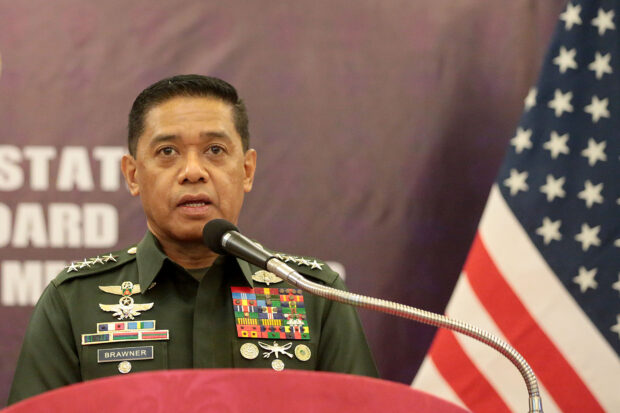Joint patrol of PH, Australia done without a hitch, says AFP chief Brawner

MANILA, Philippines — The joint patrol of the Philippines and Australia in the West Philippine Sea was “very successful” without any untoward incident, according to Armed Forces of the Philippines (AFP) chief-of-staff General Romeo Brawner.
The three-day maritime cooperative activity between Manila and Canberra officially ended on Monday.
“Our initial assessment of the maritime cooperative activity between the Philippines and Australia is that it was very successful because there were no untoward incidents,” Brawner said in a press briefing in Camp Aguinaldo in Quezon City.
However, Brawner previously announced that two People’s Liberation Army jet fighters were seen circling a Philippine Air Force’s Super Tucano attack aircraft around the vicinity of Hubo Reef in Kalayaan Island Group during the exercise on Sunday.
“The circling happened for about 15 minutes and our aircraft were able to finish their mission without any untoward incident,” Brawner said.
The top AFP official also noted that the PLA aircraft actions are not unusual.
“I don’t think it is unusual,” Brawner said, noting similar incidents involving American and Japanese aircraft.
“This is not the first time that this happened, it seems that this is now the tactic of China in the South China Sea (SCS),” he added, partly in Filipino.
This week, the Philippines and United States also conducted a three-day joint patrol in the WPS, with a PLA aircraft and warship also shadowing their activities.
China’s actions are in line with its assertion of sovereignty to almost the entire SCS with its claims overlapping with the 200-nautical miles exclusive economic zones (EEZ) of the Philippines despite an international tribunal ruling effectively dismissing its claims.
READ: Defense chief says China must show sincerity first before PH talks on WPS
Parts of the SCS inside the Philippines’ EEZ are locally referred to as the WPS.
Coastal nations have sovereign rights on their own EEZ, but other states could still invoke their right of freedom of navigation and overflight.
“We have all the right to patrol our territorial seas and our exclusive economic zone, and that is exactly what we were doing, but this time we are doing it with our allies and our partners,” Brawner said.